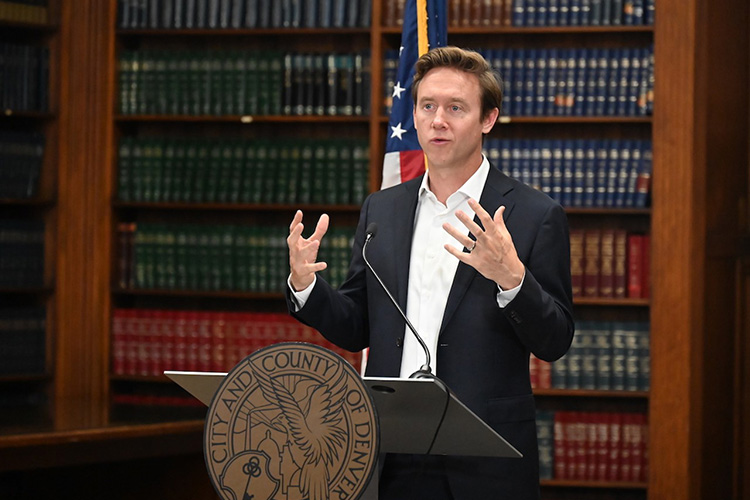
Johnston depicts his House1000 plan to improve the homelessness crisis in Denver. photo by Bennito L. Kelty
Mike Johnston, Denver’s mayor, has taken initiative towards solving Denver’s homelessness crisis.
In January of 2023, the annual homelessness report showed that 9,065 people in Denver – both those in shelters and outdoors – are currently homeless, which is a 31.7% increase from 2022. Mike Johnston is determined to change these statistics. Johnston was elected to office on June 6th, 2023. One of the first significant moves that he made when he became mayor was to declare a citywide emergency regarding the homelessness crisis. “This is our commitment on day one to say we hear you, we agree with you, and we are ready to put all of our energy and effort in the city behind delivering a solution for this,” said Johnston. His plan is to house 1000 homeless people by the end of his first year as mayor.
He pointed out the idea that larger cities with great economic growth do not have enough housing in correlation with the demand for it, which causes extremely unaffordable real estate prices. Besides not having the infrastructure needed to support a severe and nationwide mental health crisis, there are also not enough services to support people who are struggling with addiction, nor enough to help those trying to get their lives together. When paired with the housing prices, it leaves a great deal of people without homes.
Denver’s homeless problem has become increasingly worse over the last few years. One city resident, Jon Caldara, even protested homeless encampments on the steps of City Hall. Mayor Johnston, despite being on the other side of the issue, understood Caldera’s perspective. According to Fox News, Johnston’s response was “I’ve known Jon Caldara for a long time, so we’ve had more than our handful of discussions, but I think he and I share the same goal, which is that what we want is to be able to get people housed and be able to get back clean, safe public spaces that everyone can access.”
As a first step initiative on solving the problem, Johnston released a $50 million plan to get 1000 people transitioned into semi-permanent housing by the end of 2023. The focus will be on people who are living outdoors either in encampments or in their vehicles. “If we can get all those folks that are currently unsheltered into housing and can close those encampments and reactivate the city, we will have done what most other cities have struggled to do, which is actually to get people into housing and to get back vibrant, joyful, safe downtowns and no longer have encampments in them,” Johnston theorized.
One of his first administration goals is to supply federal and state resources to build tiny homes, which will make up micro communities. He also plans to convert more hotels into housing. The plan is to create 12 micro communities across the city. The tiny homes will be constructed quickly and cheaply, and hotels in those areas will be converted into housing as well. The funding will rely on state money for homelessness programs.
The administration has also made an effort to include local counties to address homelessness. Advocates for the homeless believe Johnston’s plan is a start, but there needs to be a bigger approach to such a large issue. Cathay Alderman, a part of the Colorado Coalition for the Homeless, claims the issue cannot fall on local initiatives only.
Some counties, such as Weld and Douglas County, have resisted implementing the plan due to concern that doing so will attract unhoused people into their communities. “If the state could help devise a strategy that local governments could then plug into, we’d have a much more cohesive and comprehensive approach,” Alderman explained. Despite her concerns for the execution and success of the plan Johnston has implemented, she is encouraged by his initiative, and acknowledges the difficulties he has inherited.